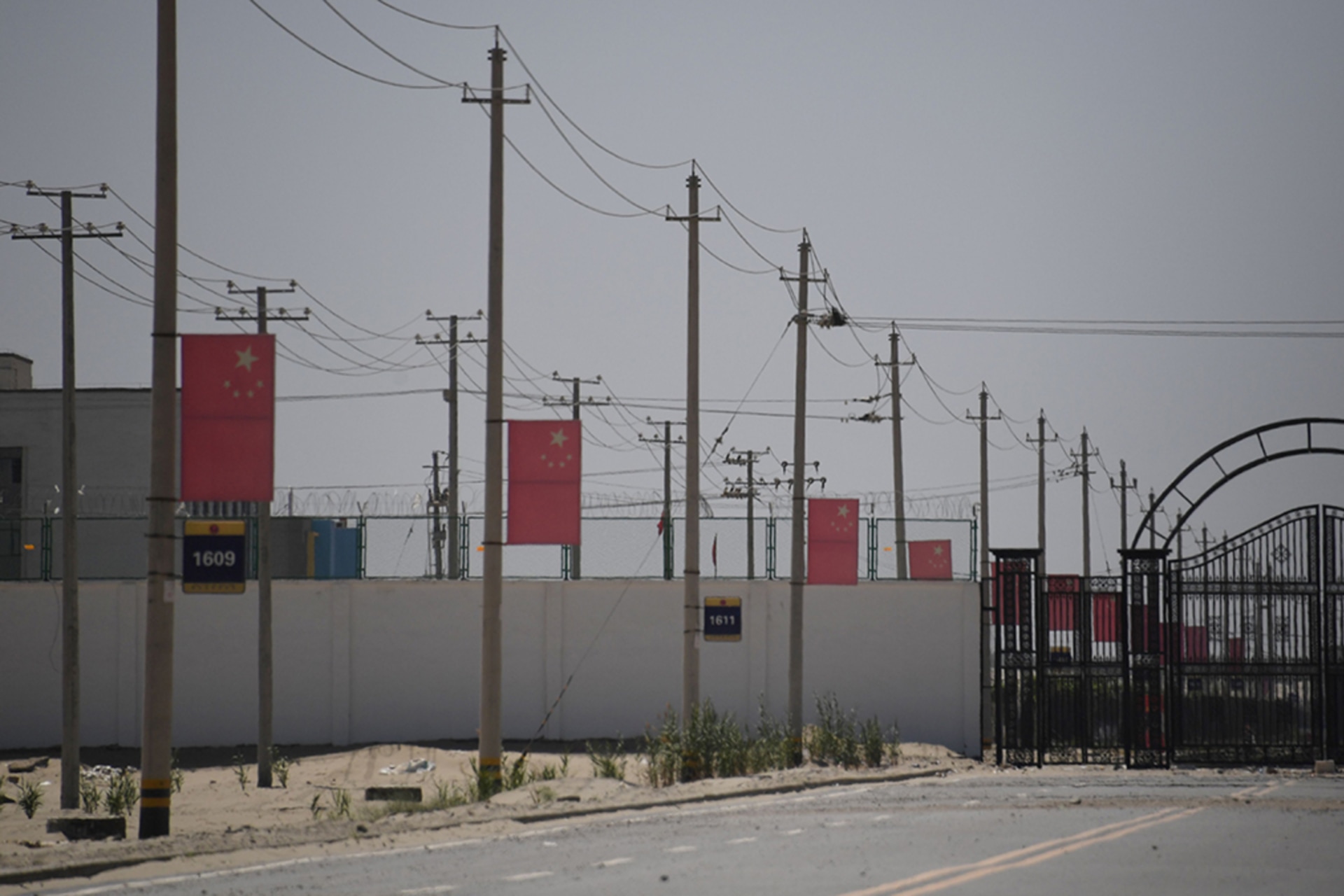China’s Abuse of the Uighurs: Does the Genocide Label Fit?
While multiple reports indicate that China has committed major abuses of the Uighur minority group, determining the most serious charges is difficult.

By experts and staff
- Published
Experts
![]() By John B. Bellinger IIIAdjunct Senior Fellow for International and National Security Law
By John B. Bellinger IIIAdjunct Senior Fellow for International and National Security Law
On his last full day in office, U.S. Secretary of State Mike Pompeo determined that the Chinese government is committing genocide against the Uighurs and other minority groups in the Xinjiang region. The Joe Biden administration is reviewing the decision.
Here’s what the genocide label means and what using it could entail for U.S. foreign policy.
What was the basis for Pompeo’s determination?
Secretary Pompeo did not provide a detailed legal or factual justification for his genocide determination. He stated that “we are witnessing the systematic attempt to destroy Uyghurs by the Chinese party-state,” and that Chinese authorities “have made clear that they are engaged in the forced assimilation and eventual erasure of a vulnerable ethnic and religious minority group.” However, he did not explain how the governing authorities had “made clear” that they were engaged in genocide.
Additionally, he determined that the Chinese authorities are also committing “crimes against humanity” against the Uighurs and other minorities in Xinjiang. These crimes include “arbitrary imprisonment or other severe deprivation of physical liberty,” “forced sterilization,” “torture,” and “forced labor.”
How has the U.S. government traditionally made such determinations?
There is no formal procedure for genocide determinations. Previous secretaries of state have announced findings of genocide in at least five other situations: Bosnia (1993), Rwanda (1994), Iraq (1995), Darfur (2004), and areas under the control of the self-proclaimed Islamic State (2016 and 2017). The internal procedure for these determinations has varied, but secretaries of state have generally made decisions based on evidence collected by the State Department’s policy and intelligence staff, which is typically assessed by department attorneys.
However, the process has sometimes led to disagreements within the State Department and between the department and Congress. Department attorneys have historically adopted a strict interpretation of what constitutes genocide for purposes of the 1948 Genocide Convention.
Why has there been such caution about using the genocide label?
There are several reasons. First, State Department lawyers have wanted to be rigorous in ensuring that a genocide determination is consistent with the Genocide Convention’s definition of the term. Second, policy officials have often been reluctant to make genocide determinations because doing so would result in pressure on the U.S. government to stop the genocide, which is often difficult to do. And third, both lawyers and policy officials have not wanted to lessen the impact of genocide determinations by applying the term to atrocities that, however horrific, do not rise to the level of genocide.
In 2019, Avril Haines, now director of national intelligence, and I chaired the advisory committee for a report written by two former State Department officials and published by the U.S. Holocaust Memorial Museum, that explained how the U.S. government makes genocide determinations. The report stated that “determinations viewed as based on doubtful evidence or deviations from the internationally accepted legal definition will be less effective in helping to mobilize support for tangible action to address the atrocities, and the value of such determinations as a means to help establish a historical record or to bear witness will be eroded.”
What is the definition of genocide?
There is a difference between use of the word genocide in common parlance, and even by human rights groups, and the Genocide Convention’s definition, which is quite narrow.
There is a difference between use of the word genocide in common parlance, and even by human rights groups, and the Genocide Convention’s definition, which is quite narrow.
The Genocide Convention, which the United States ratified in 1988, defines genocide as: “any of the following acts committed with intent to destroy, in whole or in part, a national, ethnical, racial, or religious group, as such: (a) Killing members of the group; (b) Causing serious bodily or mental harm to members of the group; (c) Deliberately inflicting on the group conditions of life calculated to bring about its physical destruction in whole or in part; (d) Imposing measures intended to prevent births within the group; (e) Forcibly transferring children of the group to another group.”
So the label hinges on the scale of the crimes?
Yes, but also on the intent of the perpetrators. The convention requires that the listed genocidal acts be conducted with an “intent to destroy” the relevant group “in whole or in part,” which the U.S. Senate has interpreted to mean in whole or “in substantial part.” U.S. law implementing the convention provides that “substantial part” means “a part of a group of such numerical significance that the destruction or loss of that part would cause the destruction of the group as a viable entity within the nation of which such group is a part.”
Taken together, these definitions require the U.S. government to find that a government or individuals have engaged in the listed acts with an “intent to destroy” an entire national, ethnic, racial, or religious group, not just some of its members. Showing that a government or individuals acted with the necessary intent is often extremely difficult to do, and this is why State Department lawyers have been reluctant to use the term genocide.
What are the legal consequences of a genocide declaration?
The legal implications are minimal under both international and U.S. law. Parties to the Genocide Convention have agreed that genocide “is a crime under international law which they undertake to prevent and to punish.” But the U.S. government has long taken the position that the convention only requires it to prevent and punish genocide that occurs in U.S. territory. The United States does not interpret that the convention requires it (or any other country) to prevent and punish genocide in other countries, or to intervene for humanitarian reasons.
However, use of the term still conveys a very powerful moral stigma. Raphael Lemkin, the Polish lawyer who coined the term during the Holocaust, said it must be “treated as the most heinous of all crimes.” A determination of genocide has historically increased pressure on the executive branch from Congress, advocacy groups, the press, and the public to take significant actions to address the genocide, including through sanctions and even military intervention.
What have Biden administration officials said about Pompeo’s determination?
They have given somewhat mixed signals, but appear to have agreed with Pompeo’s determination. Ahead of his confirmation, Secretary of State Antony Blinken said, “We’re very much in agreement…forcing men, women and children into concentration camps, trying to, in effect, reeducate them to be adherents to the ideology of the Chinese Communist Party, all of that speaks to an effort to commit genocide.” However, Pompeo’s genocide determination was issued just as Blinken’s confirmation hearing began, and the timing could have been intended to put Blinken on the spot.
Linda Thomas-Greenfield was asked about the determination in her own confirmation hearing for U.S. ambassador to the United Nations and said, “The State Department is reviewing that now because all of the procedures were not followed. They’re looking to make sure that they are followed to ensure that that designation is held.” When asked about Thomas-Greenfield’s statement, Blinken later said, “My judgment remains that genocide is [being] committed against the Uighurs, and that hasn’t changed.”
Have other countries determined that China is committing genocide against the Uighurs?
Other governments have condemned China’s actions but none has formally determined that China is committing genocide, although pressure is mounting on them to do so.
What happens next?
Pompeo’s genocide determination has boxed in the Biden administration’s ability to improve the U.S. relationship with China and, as with other last-minute Trump administration actions, this could have been its intent. To be sure, the Biden administration would have forcefully condemned Chinese actions against the Uighurs, but endorsing the genocide determination will raise public expectations for the administration to take more punitive actions against China.
As Ambassador Thomas-Greenfield suggested, the Biden administration will likely start by reviewing Pompeo’s determination. Secretary Blinken could ask department officials to issue a more detailed justification for the determination, especially evidence that Chinese authorities have an intent to destroy the Uighurs as a group. A more detailed justification will likely be necessary to persuade other governments to make similar genocide determinations and to impose multilateral sanctions.
However, taking any meaningful actions against China would be difficult and would cause significant friction between Beijing and Washington. Previous U.S. genocide determinations involved much smaller countries—such as Bosnia, Rwanda, and Iraq—with which the United States did not have significant economic relations. It would be economically and politically impossible for the United States to impose broad trade sanctions against China, even after accusing China of genocide. New targeted sanctions are more likely.
It’s also possible that, after a careful review, the Biden administration determines that China is committing crimes against humanity and “acts of genocide,” without saying that Chinese actions qualify as genocide under the Genocide Convention. Taking this position, however, would likely generate criticism from congressional Republicans and some human rights groups.
Hasn’t the Biden administration also agreed to conduct a review of whether the government of Myanmar is engaged in genocide against the Rohingya?
Yes. Blinken announced last week that he would conduct an interagency review to determine whether Myanmar’s government is committing genocide against the Rohingya. Former Secretary of State Rex Tillerson conducted a similar review in 2018 and concluded that Myanmar was engaged in “ethnic cleansing,” but stopped short of using the term genocide.
